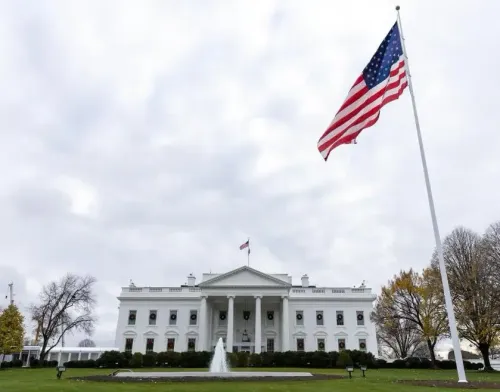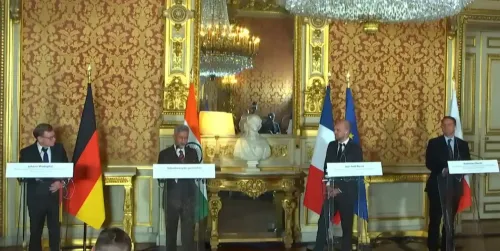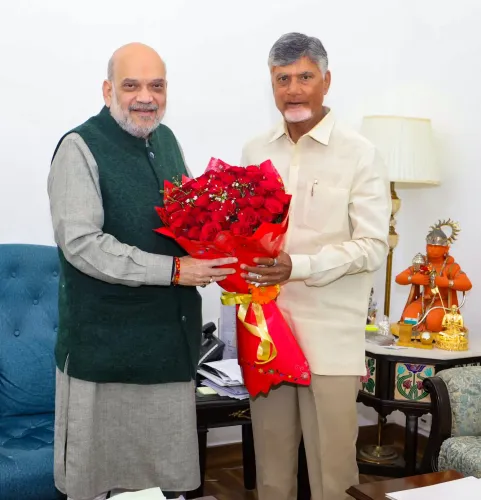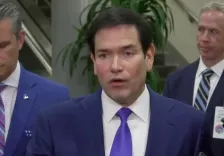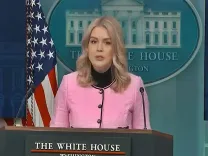Is China Aiming to Outpace the US?
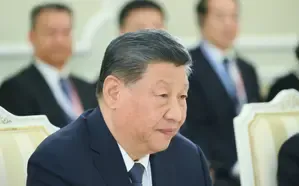
Synopsis
Key Takeaways
- Xi Jinping unveiled ambitious initiatives at the SCO summit.
- China aims to position itself as a leading global power.
- India seeks to balance its relationships with US and China.
- The SCO is pivotal for China's strategy of expanding influence.
- Tensions between US and China are escalating.
New Delhi, Sep 14 (NationPress) For Chinese President Xi Jinping, the 25th SCO summit held in Tianjin served as a pivotal platform to unveil strategies aimed at elevating China as a superpower capable of rivaling America.
In the backdrop of Donald Trump's imposition of punitive tariffs on India concerning its oil dealings with Russia, and the special invitations extended to President Putin and Kim Jong Un for the Tiananmen Square military parade, Xi seized the moment to assert his vision of a world where China plays a central role. He urged India to move beyond its fixation on border disputes and instead collaborate with China as a partner in building a fair and 'rules-based' global order.
While India shares the vision of a multipolar world, it also positions itself as a competitor to China in the Asian landscape and beyond. A thorough examination of Xi Jinping’s address reveals an ambitious agenda aiming for China to take the helm of global leadership.
During the SCO summit, Xi introduced the so-called Global Governance Initiative, highlighting Beijing's commitment to work alongside other nations to create a more equitable global governance framework. He subtly criticized the US for its Cold War mentality and hegemonic practices, advocating principles such as sovereign equality, adherence to international law, and true multilateralism. He emphasized that all nations, regardless of power or wealth, should have equal say in shaping global governance.
Interestingly, as the leader of a state rooted in classic Communism, Xi called for enhanced democracy in international relations and greater representation for developing nations. He stressed the importance of the UN in global governance and advocated for narrowing the North-South divide. Additionally, he urged SCO members to promote Belt & Road cooperation and foster inclusive economic globalization, revealing his intent to leverage economic influence to position China as a superpower that counters Trump's America while continuously advancing militarily and technologically.
The SCO now stands as the largest regional organization in Eurasia. Xi emphasized its role in promoting a multipolar world and enhancing democracy in international relations. Against the backdrop of controversial pronouncements from President Trump, Xi highlighted China's commitment to human development and global stability, sensing an opportunity to emerge as the leading world power amid a perceived decline in America's global standing.
Trump's administration has faced criticism for its remarks on India’s participation in the SCO. Trump's response on social media, suggesting that 'we have lost India, Russia to deep dark China,' followed by complaints from his commerce secretary regarding India's trade policies, illustrates the growing tension.
Fortunately, the relationship between Trump and Prime Minister Modi seems promising, as their recent exchanges suggest a positive trajectory for India-US relations. Both leaders expressed their commitment to fostering a partnership that unlocks untapped potential.
India’s involvement in both BRICS and SCO highlights its strategic approach under Prime Minister Modi. While the US views China as its primary rival, India aims to maintain a non-aligned stance while nurturing bilateral relations globally. The active role of India in the Quad initiative exemplifies its position between US and China.
Confident in its ability to manage relationships with both US and Russia, India remains committed to preventing the resurgence of Cold War dynamics, particularly in the Middle East. The primary security concern for India stems from the Sino-Pak alliance, which poses threats not only to India but also to global stability.
Thus, India’s national security strategy must focus on countering the designs of these adversaries, nurturing the India-US relationship, and advocating for democracy in the Arab states while reinforcing its position in the Global South against potential Chinese obstruction.
(The writer is a former Director of the Intelligence Bureau)



